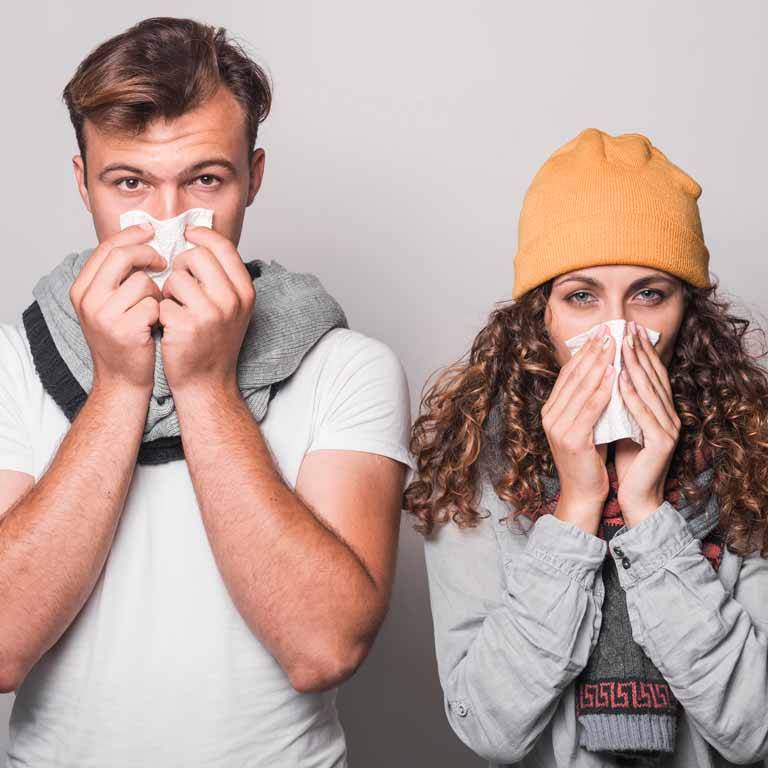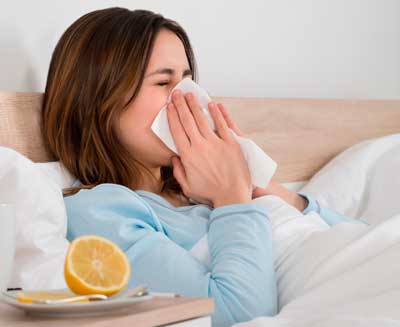
Flu or cold? Keys to differentiate them and natural remedies
Cough, sneezing, mucus, fever, joint pain, headaches are we dealing with a cold or flu? Both diseases, which are very usual in autumn and winter, have some of the same symptoms, but some others are different. Can anyone tell whether they have a simple cold or the flu when their symptoms are very similar? There are some keys to differentiate them and some natural remedies to better cope with their symptoms.
What is flu and why does it occur?
Flu is a viral infection of the respiratory tract that affects the nose, throat and lungs and is known for its quick spread. The flu is caused by the influenza virus, or flu virus, and can be caught quite easily by breathing in the droplets that people sneeze out, or by touching an object containing the virus and putting our hands in our mouth, nose or eyes.

Main symptoms of flu
The most frequent symptoms of the flu affect, as we mentioned before, the nose, throat and lungs. Its main symptom is a quick and sudden outbreak with a high fever that may reach over 38°C and appears between one and five days after exposure to the flu virus.
Other symptoms that many people have with the flu are:
- Cough
- Sore Throat
- Nasal secretion or congestion
- Muscle or body pains
- Headaches
- Fatigue and tiredness, even severe fatigue
- Nausea and diarrhoea, more often in children than in adults.
It is important to be aware that, although the most common symptom of flu is fever, not all patients with flu suffer from fever.
How long does the flu last?
Symptoms may last about a week, between five and ten days. The first symptom to disappear is fever, which is usually treated within 3 to 5 days. Other symptoms, such as coughing, often last up to ten days, and tiredness sometimes for two weeks.
The most vulnerable are children and the elderly
The World Health Organization (WHO) says there are a number of population groups that are at higher risk of suffering complications from flu. These groups are:
- Pregnant women.
- Babies and young children, especially those under 2 years of age.
- People with chronic diseases, especially respiratory diseases.
- People who are immunosuppressed.
- People over the age of 65.
- People who have been in hospital for a long period of time or in residential homes
The WHO recommends in such cases to get an influenza vaccine and to take extreme hygienic precautions, such as wash your hands often , to prevent the spread of the virus.
What should you take for flu?
Most of the treatments we use for flu are made to attack the symptoms, not the disease. The Ministry of Health has developed a few practical tips on how to get over the flu that may help you:
- Have a rest.
- Drink plenty of fluids.
- Avoid the use of alcohol or tobacco.
- Do not use antibiotics, as they do not relieve the symptoms or improve the recovery process.
- If your symptoms remain, you should always visit your doctor and follow his or her advice.
What is the common cold and why does it happen?
The common cold, like flu, is an illness caused by a virus that affects the nose and throat and usually the entire upper respiratory tract. The viruses that cause flu and colds are not the same. The way they are transmitted is the same as for flu; when we have a cold we usually cough up small droplets that can be breathed in by other people. We can also "catch a cold" by coming into contact with objects where the virus is present.

First symptoms of a cold
We have all had a cold at some time. The possibility of having a cold is more common in autumn and winter, it is possible to "catch a cold" at any time. The early signs of a cold are a painful sore throat and runny nose, which are followed by coughing and sneezing, which are of gradual onset and with an occasional fever below 38°C.
In short, the symptoms are as follows:
- Sore throat
- Runny nose
- Dry cough
- Sneezing
- Headache
- Pain in the body
How long does a cold last?
There is no time limit for recovering from a cold. Most often we can start to feel better within 7-10 days after we begin to feel the first symptoms of a cold. It is very important to visit a doctor if the cold does not become better, as an untreated cold can result in other more severe cases such as bronchitis or pneumonia, mainly in people who have low defences or whose immune system is weakened.
What to take for a cold?
Unlike other viral illnesses, there is no known treatment for colds, though we can try to relieve their symptoms. In general, it will make you feel better by following these recommendations carefully:
- Take enough rest.
- Drink plenty of liquids, especially water.
- Find out how to clean your nose to prevent broken blood vessels
- Use a clean air humidifier or a cold air vaporiser in the room you are in.
- Avoid tobacco, alcohol and polluted environments.
Remember that, like the flu, antibiotics will not help you recover from a cold because antibiotics are not effective against viruses. Follow the recommendations of your doctor.
What are the main differences between flu and common cold?
Colds and flu have the same viral origin, although the viruses are different, and their mode of transmission is also different.
There are some very important differences that will allow you to know if you have a cold or the flu. Firstly, flu is known for its abrupt outbreak and epidemic spread. In addition, flu has a preventive vaccine which, until now, does not apply to the common cold.
Other differences between flu and cold are:
- Fever. It is the most differential factor between both. High fever, which is between 38 and 40 degrees, is usually common with the flu from its outbreak for at least the first three days. Cold hardly causes fever, and if it does, it is usually below 38 degrees.
- Coughing. Both diseases have the same symptoms, but the kind of cough is different. With the flu, the cough is common, very bad and with a lot of mucus, while with colds it is a more mild and dry cough.
- Sneezing usually comes with a cold, but not with flu.
- Mucus. A runny nose, nasal congestion and mucus are very common with the common cold, but it is unusual with the flu.
- Muscle aches and headaches. These are some of the most uncomfortable symptoms of the flu and do not usually happen with colds. Muscle pains often affect the joints and back and often make you have to stay in bed.
What do you do when you already have a cold or the flu?
If you already have a cold or the flu, it is recommended that you keep a safe distance from other people to avoid infection, and follow the recommendations given below to help you recover:
- Have a rest.
- Avoid cold and dampness.
- Wash your hands often to prevent transmission.
- Add vitamins and minerals to your diet.
- Drink plenty of fluids to stay well hydrated.
- Don't smoke and avoid smoky environments.
- Gargle with hot water with lemon and honey.
- Use eucalyptus vapours to relieve your stuffiness.
- Visit your doctor and avoid self-medication.
- Do not use antibiotics, as they are not useful in a viral disease.
How to prevent flu and colds?
There are no foolproof tricks for avoiding them, but there are some tips you can follow to try and have a winter free of flu and colds. Please read them:
- Have your rooms often ventilated to avoid closed or " stuffy " spaces.
- Cover your mouth and nose when you sneeze. Use disposable tissues and, if they are not available, avoid contact with your hands. It is better to cough or sneeze into your elbow.
- Have a diet rich in vitamin C and vitamin A. Eating foods rich in vitamin C and vitamin A reinforce the immune system. Foods such as oranges, lemons, vegetables or carrots are rich in these vitamins. You can also take vitamin C food supplements to supplement your diet.
- Don't share glasses, cutlery or napkins. These are ways of transmission so they should always be used individually.
- Wash your hands often. Use soap and water carefully and then wash for at least 20 seconds.
Are there natural remedies for the respiratory tract?
There are natural remedies which can help us to get over the flu or cold better:
- Vitamin C. Vitamin C contributes to the normal function of the immune system, and to the decrease of tiredness and fatigue, so it is the perfect ally for recovering from flu and cold diseases.
- Eucalyptus fumes. They are usually used to help normal respiratory functioning, which allows you to breathe easily and soothe your throat.
- Ginger. This root is used traditionally in flu treatments due to its properties on the immune system, the respiratory tract and physical activity.
- Essential oils. A number of essential oils, such as a blend of peppermint, clove and rosemary essential oils, may help you feel better when you are breathing. You may use them as aroma diffusers in your room (always follow the use instructions).
- Food. Some nutrients found in foods such as garlic, mustard or pepper are often used to relieve nose discomfort.





